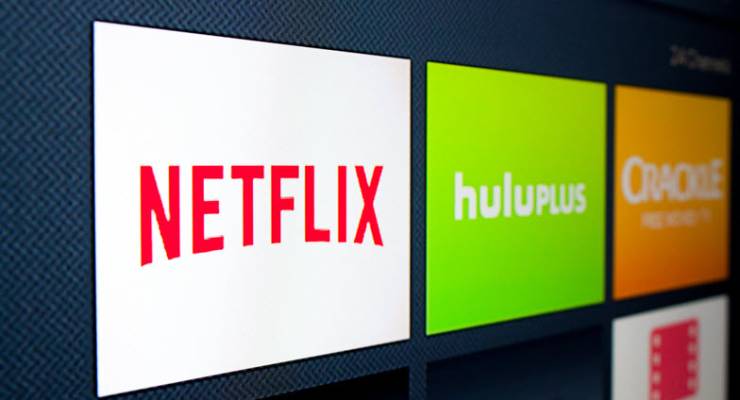
The future of television — including television in Australia — is being shaped right now by a battle for scale and reach between US media and telecommunications giants. It’s a fight for survival in a streamed world. Just how many streaming services can the market bear? Not very many.
Australia loves a duopoly, and with Netflix seizing the early mover advantage, the takeover and counter-takeover bids in the US and UK seem about winning the play-off for the right to go head-to-head with the newcomer. In Australia, Netflix has surged with about 4 million subscribers (about one-third of all households), paying about $200 a year. This is far in front of Stan — a joint venture between Fairfax Media and Nine Entertainment — which claims just under 1 million subscribers. Following its takeover of the Ten network, the US network CBS has foreshadowed releasing its All Access streaming service too, which sells in the US for about $150 a year. And on a different measure, the ABC’s free platform iView claims about 3 million unique visitors each month.
Ultimately, challenging Netflix will rely on depth of content and infrastructure.
The key piece in play here is the Murdochs’ 21st Century Fox. Last week, Comcast confirmed its counter to snatch 21st Century Fox from the foreshadowed Disney merger. This followed the Comcast bid to seize control of UK Sky News from Fox before it could be passed onto Disney.
For streaming, the winner gets the 21st Century Fox library and, critically, majority control of the Hulu streaming service currently 30% owned by each of Disney, Comcast and 21st Century Fox. (Not currently available in Australia without a VPN.) For Disney, it gives a greater edge to their content (thank you, FX), to complement the family-friendly Disney brand. For Comcast, it makes them a global corporation, rather than merely a US player.
At the same time, the fourth player, Time Warner — owner of CNN, among other things — is seeking scale through vertical integration (similar to Comcast) by merging with Telco giant AT&T.
As Australians know too well, all media mergers are political, and the AT&T-Time Warner proposal has been side-swiped by a surprising intervention from Trump’s Department of Justice. This despite the payments by AT&T for “insights into the new administration” to Essential Consultants, owned by Trump lawyer, Michael Cohen.
In the fight for scale, one or two of the four major US television networks is in danger. From an Australian perspective, it’s hard to grasp that the Murdochs are the prey, not the hunter.
As recently as 2014, 21st Century Fox, although the smallest of the four, was seeking to vault into the top rung with a takeover/merger with Time Warner. Australians would see this a reprise of the Murdoch takeover of the Herald and Weekly Times Ltd, which saw the company leap from a distant third to become the dominant newspaper company that we now know, at a time when papers were still rivers of cashflow gold.
The Time Warner proposal never morphed into a formal bid, in part because of the continuing hangover of the UK hacking scandal and, in part, because it was likely a takeover would force a democratisation of the company’s structure. Currently, the weighted voting of shares gives the Murdochs 37% of votes despite owning only about 17% of the capital.
Beyond scale, streaming success for old media companies demands they be prepared to eat themselves. Easier said than done. That’s a problem for Foxtel, who are likely to look to align as the local platform for whichever old media grouping emerges from the current US streaming imbroglio.
Right now, Foxtel’s subscription base is slipping under pressure from Netflix. It’s attempting to compete directly with its own streaming offering, although more as an add-on that a direct product. It’s also differentiating through a focus on sport.
But it carries the costs that come from the baggage of technology — all those wires, and boxes and satellite — and the cost of sports rights. And in a world where households are likely to choose only one service, cost is likely to be the decisive factor.
NOTE: An earlier version of this story incorrectly stated that Time Warner owned ABC. That mistake has been corrected.








Australians do not love duopolies! We hate monopolies, duopolies or ‘opolies’ of any kind. Greedy, lazy govts that have foisted these opolies on the rest of us, always for short term monetary gain and always with a lack of regulation. Banks, insurance, electricity, communications, you name it, whenever public companies are privatised or private companies are allowed to become too large, the public ends up pay through the nose. Don’t wonder why the cost of living has skyrocketed, look no further than the list above, in almost every case we pay way above the OECD average.
Once upon a time economic geniuses were proclaiming “get big or get
out” when led to the Age of Giants.
As with the dinosaurs they so closely resemble, too much of their energy goes into maintaining the lumbering behemoths grinding down the land.
Too dumb to know their time has passed, in effect dead & stinking but just haven’t stopped moving, due entirely to the necrotic worms giving a semblance of life.
Yeah… I already knew this was all happening. I know what AT&T is. I thought this would some huge analysis so I created an account. I love that TV is finally getting good in Australia. Foxtel is horrible and expensive. Netflix is awesome. I use SBS on Demand, 9Now and Tenplay in addition to Netflix. It’s a good combo. Still nowhere near what Americans have. And we don’t love duopolies. Who said that? You? In fact my fam and friends don’t like monopolies and duopolies, namely Telstra. The NBN might be a problem if it’s sold off too, as Telstra was.